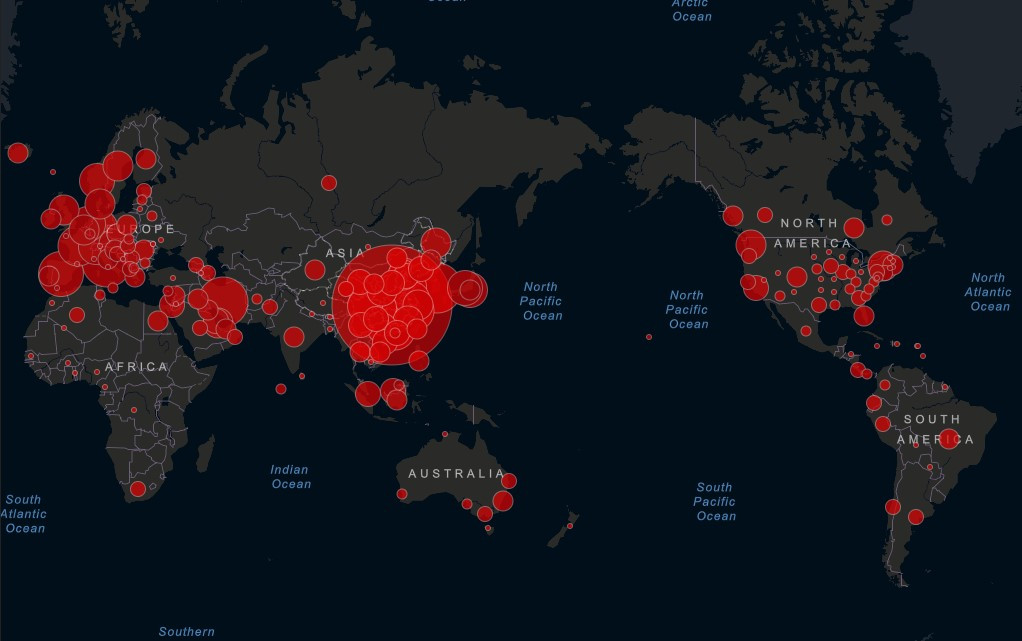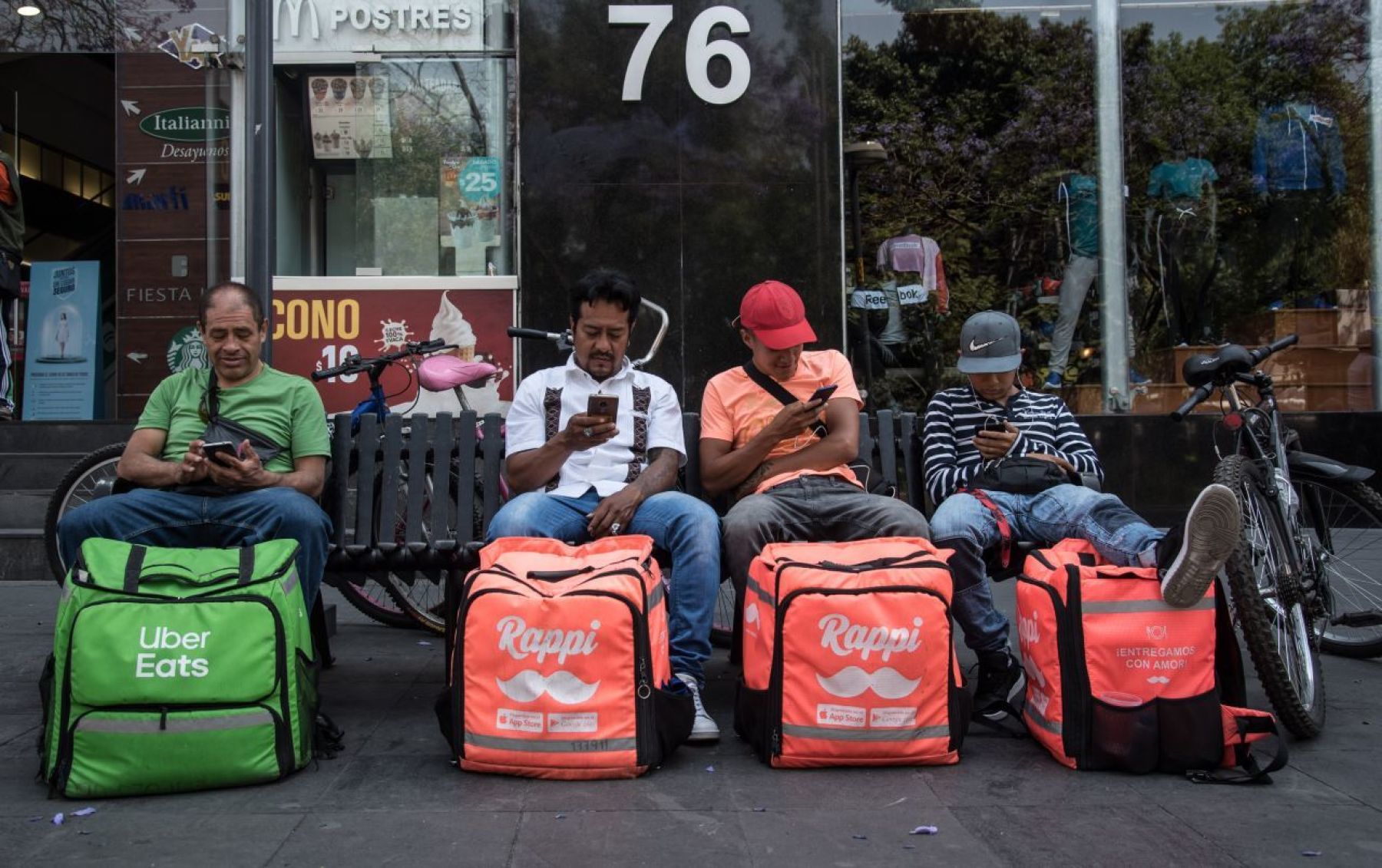In tempi di pandemia anche il pensiero critico deve interrogarsi su come sta cambiando il mondo. Quali categorie politiche, economiche e sociali possono essere utili per analizzare l’impatto del Covid-19 sugli spazi urbani, l’organizzazione del lavoro, le catene globali del valore, il progetto neo-liberale, gli equilibri geopolitici su scala mondiale, le forme di lotta e i soggetti resistenti?
Into the Black Box curerà in questo periodo una lista settimanale di letture utili per interrogarsi attorno a tutti questi nodi.
Qua tutte le reading list.
In times of pandemic, even critical thinking has to question how the world is changing. Which political, economic and social categories can be useful to analyze the impact of Covid-19 on urban spaces, work organization, global value chains, the neo-liberal project, geopolitical balances on a global scale, forms of struggle and resistant subjects?
Into the Black Box will be producing a weekly list of readings during this period, which will be useful to ask questions about all these issues.
Here are all the reading lists.
Geography
Covid-19 : à Paris, des propriétaires délaissent Airbnb pour la location longue durée
http://www.leparisien.fr/immobilier/covid-19-a-paris-des-proprietaires-delaissent-airbnb-pour-la-location-longue-duree-17-05-2020-8318499.php
Face aux annulations en pagaille de leurs locations à cause de la pandémie, de plus en plus d’hôtes abandonnent la plate-forme de location touristique. Certains pensent même à revendre leur bien.
Come cambieranno le città degli affitti brevi e di Airbnb dopo la pandemia
https://www.che-fare.com/celata-citta-affitti-piattaforme-pandemia/
In queste settimane di lockdown si è parlato molto di affitti brevi, piattaforme per affitti brevi e la regina di queste piattaforme: Airbnb. Si è registrato un crollo delle prenotazioni. Qualcuno ha parlato di “fine di Airbnb”. D’altronde era uno dei temi caldi prima della pandemia; soprattutto in Italia dove con molto ritardo si era iniziato a discutere di impatti, ipotesi di regolamentazione, tassazione, ecc. In crisi tuttavia non è solo Airbnb, ma l’intero comparto turistico. Il “modello Airbnb” però è diverso.
Labour
Uber Lays Off 3,500 Employees Over A Zoom Call—The Way In Which A Company Downsizes Its Staff Says A Lot About The Organization
https://www.forbes.com/sites/jackkelly/2020/05/13/uber-lays-off-3500-employees-over-a-zoom-call-the-way-in-which-a-company-downsizes-its-staff-says-a-lot-about-the-organization/#7f924ea07251
In this challenging COVID-19 climate, many companies are having a hard time. Their revenue has slowed and profits have evaporated. In cost-cutting measures, businesses have had to make the hard decisions to layoff staff. Some are empathetic, while others take a more callous and uncaring approach to this sensitive matter. This week, Uber announced that it will layoff 3,500 employees, representing 14% of its workforce. In a sign of the times, with employees working from home, Uber informed the job-loss casualties via an online Zoom call.
Presente y futuro del empleo tras el covid-19, ¿hacia dónde vamos?
https://www.elsaltodiario.com/laboral/presente-futuro-empleo-tras-covid-19-hacia-donde-vamos
La “nueva normalidad” no está escrita. Su forma y fondo serán el resultado de si se imponen los intereses de la patronal o de las trabajadoras y trabajadores. Por ello, recuperar la fuerza del sindicalismo es imprescindible para salir de esta crisis con más derechos.
Gli ‘eroi’ della pandemia essenziali per le nostre società: precari, sottopagati, senza tutele
https://www.valigiablu.it/lavoratori-essenziali-pandemia/
Una delle parole che hanno caratterizzato questi mesi di lockdown è stata “eroi”, utilizzata per definire migliaia di lavoratrici e lavoratori della sanità in prima linea nella risposta alla diffusione del nuovo coronavirus. In Italia così come in altri paesi, il loro lavoro è stato celebrato con lunghi applausi di gratitudine dai balconi. Con il passare dei giorni, si è fatta strada la categoria più ampia dei “lavoratori essenziali”. Non solo personale medico e sanitario o che lavora negli ospedali, ma tutti coloro per i quali non è esistito lockdown o smart working, impegnati nel garantire al resto della popolazione che la vita, in qualche modo, potesse andare avanti.
Livrer des burgers au temps du Covid-19. Pour le capitalisme de plateforme, la crise comme opportunité
https://www.contretemps.eu/capitalisme-plateforme-deliveroo-uber-covid19/
Dans cet article, Chloé Lebas décrit la condition des travailleurs ubérisés durant la crise du Covid-19, interroge les stratégies des entreprises qui composent le « capitalisme de plateforme » et donnent à voir les résistances opposées par les forces syndicales et par ces travailleurs eux-mêmes à la surexploitation et aux risques que ces entreprises n’hésitent pas à faire peser sur eux.
Economics
Petróleo, covid-19 y valor-trabajo
https://www.cuartopoder.es/ideas/2020/05/18/petroleo-covid-19-y-valor-trabajo-ismael-de-la-villa/
“¿Ha perdido el petróleo su valor a nivel productivo?. En absoluto. Una teoría que nos podría proveer de una serie de claves es la teoría marxista del valor-trabajo”. “El petróleo no ha dejado de tener valor por perder valor de uso. Lo sigue y lo seguirá teniendo con toda seguridad”. “Es muy probable que nos estemos asomando a un escenario de mayor avance del modelo extractivismo y un incremento de las desigualdades entre países productores”.
Coronavirus Will Stretch, Not Break, Global Supply Chains
https://www.bloomberg.com/opinion/articles/2020-05-16/coronavirus-won-t-break-global-supply-chains
Top-down attempts to reform the global trading system in the aftermath of shocks to the world’s supply chains have rarely succeeded. The post-coronavirus world is likely to be little different. The growth in international commerce may indeed slow as growth stagnates — but the share of trade going to China and tax havens is more likely to grow than shrink.
Philosophy
Rereading Marx on machines in the time of COVID-19
http://www.focaalblog.com/2020/05/15/gavin-smith-rereading-marx-on-machines-in-the-time-of-covid-19/
The COVID-19 pandemic has stripped the veneer off capitalist society whether in its softer social democratic version or its bare-faced pseudo Darwinian version. Both the cause and the cure are down to the way capitals, now thoroughly integrated into states, have driven the direction of technology to produce this perfect storm. The staggering failures at the curing end are not just glaringly obvious in the present crisis; you’d have to be especially starry-eyed not to see that the wheels and most of the chassis had been stripped off public health well before now. But at the causative end “the normalizing [of] the batshit crazy presently underway,” risks being lost in the chatter.
Problèmes de la transition
https://blog.mondediplo.net/problemes-de-la-transition
La transition n’est pas une question « écologique » (pour « écologistes »). Il ne s’agit pas de transiter vers un « capitalisme-respectueux-de-l’environnement » — on appelle « quadrature du cercle » les projets de transition vers les cercles carrés, et ça n’a jamais très bien fonctionné. Il ne s’agit pas de sortir du capitalisme « pas encore vert ». Il s’agit de sortir du capitalisme tout court.
Necropolítica: lo que ha revelado el virus
https://www.filco.es/necropolitica-lo-que-ha-revelado-el-virus/
En tiempos de reclusión generalizada, creación de fronteras donde ya se las había abolido, cierre de espacios aéreos y una avalancha de muertos diseminada por todo el planeta, resulta muy esclarecedor volver al pensamiento de Achille Mbembe, el filósofo camerunés, que acuñó el concepto de necropolítica, entendiéndola como una técnica característica del capitalismo globalizado.
History
Coronavirus y capitalismo ¿Qué caracteriza a las epidemias modernas?
https://www.sinpermiso.info/textos/coronavirus-y-capitalismo-que-caracteriza-a-las-epidemias-modernas
Después de cuatro meses inmersos en una de las pandemias más grandes de nuestro tiempo, podría ser útil mirar a nuestro planeta y hacer la pregunta: ¿qué distingue a las pandemias que comenzaron con la gripe española a principios del siglo pasado y nos han llevado, a través del VIH, Sars and Mers, las pandemias de gripe porcina y aviar, a la Covid-19 de hoy? ¿Cómo se diferencian de las epidemias conocidas anteriores? ¿Y cuáles son las perspectivas?
Politics
Covid-19, estructura y coyuntura, ideología y política
https://rebelion.org/covid-19-estructura-y-coyuntura-ideologia-y-politica/
La crisis desatada por la pandemia del COVID-19 tiene desconcertadas a las autoridades públicas de todos los países. No es para menos, habida cuenta su magnitud (escala global, gravedad de efectos), su complejidad multidimensional (crisis sanitaria, pero también económica, política y social), y la oscuridad que rodea a su etiología y cura (la medicina sigue investigando el origen de la mutación viral y buscando desesperadamente una vacuna). Se lo reconozca o no, lo cierto es que nadie sabe con certeza cómo salir del atolladero; atolladero al que tampoco se sabe muy bien –la verdad sea dicha– cómo diablos se llegó. Prácticamente la totalidad de lxs economistas ya se atreve a vaticinar que la recesión resultante de todo esto superará con creces a las de 2008 (crisis de las hipotecas) y 1973 (crisis del petróleo).
Geopolitics
How Capitalism and Other Viruses Are Ravaging the Global South
https://jacobinmag.com/2020/05/coronavirus-global-south-pandemic-food-production-farmers/
Across the Global South, the coronavirus crisis has highlighted how IMF “structural adjustment” policies have undermined public health care. But the devastation wrought by the economic shutdown also owes to a longer-term ill: an exploitative global trade regime where the poorest countries finance the rich.
Logistics
What Happened to the Great American Logistics Machine
https://www.nytimes.com/2020/05/22/business/logistics-supply-chains.html?referringSource=articleShare
It started with silence, or something close to silence, or perhaps it was simply the absence of a low-level hum that nobody knew was humming until it stopped. In the quiet we realized that, until the pandemic arrived, we had lived in a vast, elaborate, whirring contraption that delivered culture and commerce at spectacular speeds, with astonishing efficiency. Logistics — the science of making Thing A and delivering it to Point B — had become a national art form, the corporate answer to jazz, stand-up comedy and end-zone dances. America was like an operating system that upgraded itself so regularly that its design and endless enhancements were taken for granted.
The Rebirth of a Logistic Workers’ Movement?
https://www.dissentmagazine.org/online_articles/the-rebirth-of-a-logistic-workers-movement
The history of rank-and-file organizing at UPS reveals the opportunities and challenges for a union movement of delivery and warehouse workers. An interview with Joe Allen, author of The Package King.



